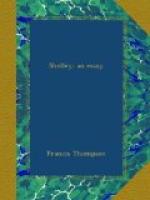It may be thought that in our casual comments on Shelley’s life we have been blind to its evil side. That, however, is not the case. We see clearly that he committed grave sins, and one cruel crime; but we remember also that he was an Atheist from his boyhood; we reflect how gross must have been the moral neglect in the training of a child who could be an Atheist from his boyhood: and we decline to judge so unhappy a being by the rules which we should apply to a Catholic. It seems to us that Shelley was struggling—blindly, weakly, stumblingly, but still struggling—towards higher things. His Pantheism is an indication of it. Pantheism is a half-way house, and marks ascent or descent according to the direction from which it is approached. Now Shelley came to it from absolute Atheism; therefore in his case it meant rise. Again, his poetry alone would lead us to the same conclusion, for we do not believe that a truly corrupted spirit can write consistently ethereal poetry. We should believe in nothing, if we believed that, for it would be the consecration of a lie. Poetry is a thermometer: by taking its average height you can estimate the normal temperature of its writer’s mind. The devil can do many things. But the devil cannot write poetry. He may mar a poet, but he cannot make a poet. Among all the temptations wherewith he tempted St. Anthony, though we have often seen it stated that he howled, we have never seen it stated that he sang.
Shelley’s anarchic principles were as a rule held by him with some misdirected view to truth. He disbelieved in kings. And is it not a mere fact—regret it if you will—that in all European countries, except two, monarchs are a mere survival, the obsolete buttons on the coat-tails of rule, which serve no purpose but to be continually coming off? It is a miserable thing to note how every little Balkan State, having obtained liberty (save the mark!) by Act of Congress, straightway proceeds to secure the service of a professional king. These gentlemen are plentiful in Europe. They are the “noble Chairmen” who lend their names for a consideration to any enterprising company which may be speculating in Liberty. When we see these things, we revert to the old lines in which Persius tells how you cannot turn Dama into a freeman by twirling him round your finger and calling him Marcus Dama.
Again, Shelley desired a religion of humanity, and that meant, to him, a religion for humanity, a religion which, unlike the spectral Christianity about him, should permeate and regulate the whole organisation of men. And the feeling is one with which a Catholic must sympathise, in an age when—if we may say so without irreverence—the Almighty has been made a constitutional Deity, with certain state-grants of worship, but no influence over political affairs. In these matters his aims were generous, if his methods were perniciously mistaken. In his theory of Free Love alone, borrowed like the rest from the Revolution, his aim was as mischievous as his method. At the same time he was at least logical. His theory was repulsive, but comprehensible. Whereas from our present via media—facilitation of divorce—can only result the era when the young lady in reduced circumstances will no longer turn governess but will be open to engagement as wife at a reasonable stipend.




